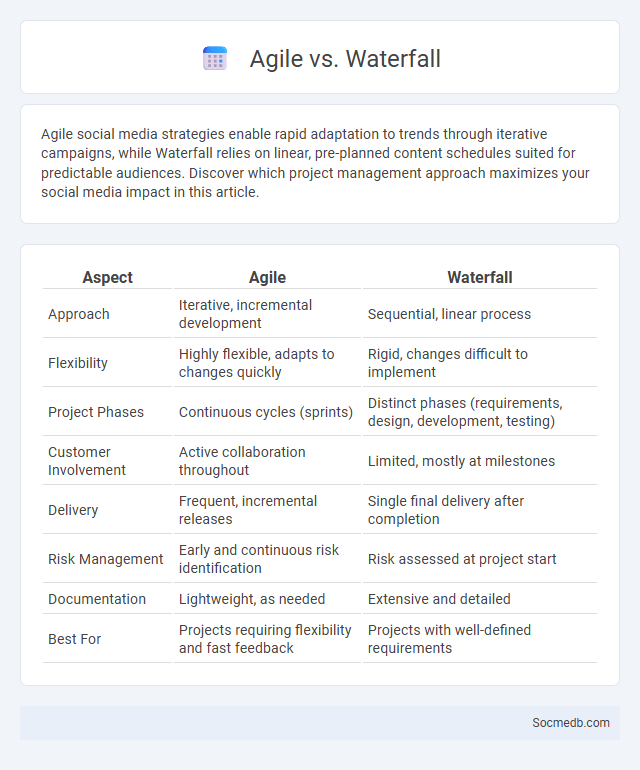
Photo illustration: Agile vs Waterfall
Agile social media strategies enable rapid adaptation to trends through iterative campaigns, while Waterfall relies on linear, pre-planned content schedules suited for predictable audiences. Discover which project management approach maximizes your social media impact in this article.
Table of Comparison
| Aspect | Agile | Waterfall |
|---|---|---|
| Approach | Iterative, incremental development | Sequential, linear process |
| Flexibility | Highly flexible, adapts to changes quickly | Rigid, changes difficult to implement |
| Project Phases | Continuous cycles (sprints) | Distinct phases (requirements, design, development, testing) |
| Customer Involvement | Active collaboration throughout | Limited, mostly at milestones |
| Delivery | Frequent, incremental releases | Single final delivery after completion |
| Risk Management | Early and continuous risk identification | Risk assessed at project start |
| Documentation | Lightweight, as needed | Extensive and detailed |
| Best For | Projects requiring flexibility and fast feedback | Projects with well-defined requirements |
Introduction to Project Management Methodologies
Project management methodologies provide structured approaches to planning, executing, and monitoring social media campaigns, ensuring efficient resource allocation and timely delivery. These methodologies, such as Agile, Waterfall, and Scrum, help your team adapt to changing trends and audience preferences while maintaining clear objectives and accountability. By applying the right project management framework, you enhance collaboration, track progress effectively, and maximize the impact of your social media strategy.
Overview of Agile Methodology
Agile Methodology revolutionizes social media management by promoting iterative development and continuous feedback, enabling teams to quickly adapt strategies based on real-time audience engagement. Your social media campaigns benefit from Agile's sprint cycles, which allow rapid testing and refinement of content to maximize reach and interaction. This approach improves collaboration, transparency, and responsiveness, ensuring your social media efforts remain aligned with evolving trends and user preferences.
Overview of Waterfall Methodology
The Waterfall methodology is a linear project management approach often used in software development and social media campaigns to ensure structured progress through defined phases: requirements, design, implementation, testing, deployment, and maintenance. This method provides clear documentation and milestones that help track your social media project from inception to completion in a sequential flow. By following the Waterfall approach, you can maintain clarity on project scope and deadlines, reducing risks associated with ambiguous or overlapping tasks.
Core Differences: Agile vs Waterfall
Agile social media strategies emphasize iterative content development, continuous feedback, and rapid adjustments to audience engagement, contrasting with Waterfall's linear planning, strict timelines, and fixed campaign structures. Agile enables real-time data-driven decisions, maximizing campaign relevance and responsiveness, whereas Waterfall relies on upfront content approval and sequential execution, often delaying adaptation to trends. The core difference lies in Agile's flexibility and iterative optimization versus Waterfall's rigid, sequential process, impacting campaign agility and effectiveness on dynamic social media platforms.
The Role of Skills Assessment in Project Success
Skills assessment plays a critical role in ensuring project success by accurately identifying the capabilities required for social media campaigns and matching them with your team's strengths. Effective evaluation of expertise in content creation, analytics, and community management enables targeted training and resource allocation. This strategic alignment minimizes risks, improves collaboration, and maximizes ROI in social media projects.
Integrating Skills Assessment within Agile Frameworks
Integrating skills assessment within agile frameworks enhances team adaptability and project efficiency by continuously evaluating individual competencies against project requirements. Your ability to identify skill gaps through iterative reviews ensures targeted training and optimal resource allocation, fostering a high-performing social media team. This approach aligns talent development with agile principles, driving continuous improvement and successful campaign execution.
Skills Assessment Strategies for Waterfall Projects
Skills assessment strategies for waterfall projects involve structured evaluation techniques such as competency matrices, performance reviews, and targeted testing to measure team capabilities accurately. Utilizing social media platforms enables real-time feedback, peer reviews, and collaborative skill-building, enhancing your team's proficiency within the rigid phases of waterfall methodologies. Implementing these strategies ensures precise alignment of skills with project requirements, optimizing productivity and success in waterfall project delivery.
Case Studies: Real-world Application of Methodologies and Skills Assessment
Case studies in social media demonstrate how targeted methodologies and skills assessments enhance campaign effectiveness and audience engagement. Your ability to analyze metrics such as engagement rates, conversion tracking, and sentiment analysis directly influences strategic decision-making and content optimization. Real-world applications reveal patterns that improve brand visibility and ROI through data-driven adjustments and skillful content creation.
Selecting the Right Methodology and Assessment Approach
Selecting the right methodology for social media analysis involves choosing between qualitative techniques like content analysis and quantitative methods such as sentiment analysis or engagement metrics evaluation. Effective assessment approaches prioritize data accuracy, platform-specific behaviors, and target audience insights to maximize relevance and impact. Employing hybrid models that integrate user interaction data with automated analytics tools enhances the depth and reliability of social media performance evaluations.
Conclusion: Maximizing Project Outcomes with the Right Blend
Maximizing project outcomes requires the strategic use of social media platforms tailored to your target audience and project goals. Leveraging data analytics and engagement metrics ensures your content resonates and drives meaningful interactions. You can enhance visibility, collaboration, and overall success by integrating the right blend of social channels and marketing techniques.
 socmedb.com
socmedb.com